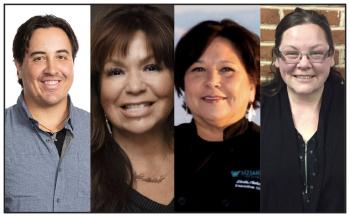Image Caption
Summary
Local Journalism Initiative Reporter
Windspeaker.com
Marilyn Jensen is a firm believer that when it comes to reconciliation every Canadian has a role to play.
Jensen, the president of the Yukon First Nations Culture and Tourism Association, was one of the speakers on a panel titled Indigenous Tourism is Reconciliation In Action at last week’s National Indigenous Tourism Conference held in Calgary.
During this hour-long session, panelists spoke on how Indigenous tourism plays a vital role in educating and sharing Indigenous culture.
Also shared was the fact non-Indigenous Canadians gain new perspectives by experiencing Indigenous tourism experiences.
“I always say that reconciliation is a collective journey between Indigenous people and everyone else in Canada because this is all of our responsibility,” Jensen said. “It’s not just you, Indigenous people. ‘Go figure it out and then tell us what to do’.”
Jensen added that educational journey is not an easy one to take.
“It’s is a painful journey because obviously it has literally unearthed tragedies and terrible, terrible circumstances that unfortunately I think mainstream Canada does not know about because our history was not taught properly,” she said.
Jensen also believes reconciliation efforts require some deeper introspection.
“It can’t just be surface level,” she said. “It has to take us to the terminology we’ve heard about quite a lot lately into action. It can’t just be words, like shallow words. It has to be more significant and have more meaning and reflective of something that is actually helping heal people in our communities.”
Jensen was joined by three other panelists. They were Jason Johnston, Sheila Flaherty and Jamie Thomas.
Johnston is the interpretive program co-ordinator at Cape Croker Park in Ontario. Flaherty is a chef in Iqaluit who owns a business called Sijjakkut. And Thomas is the cultural director for Lennox Island First Nation in Prince Edward Island.
Johnston has worked for various organizations for the past 15 years in the tourism sector and in natural resource education.
“I’ve noticed there’s been a big change in how open people are to hearing about Indigenous history from Indigenous perspectives but also about how much pushback there was in some organizations to be able to share history that doesn’t follow along with what Canadian history that has been presented for such a long time,” he said.
Johnston said he’s discovered being honest is the best approach when it comes to educating others.
“It took a couple of years for me to figure out that being really open and in some cases really blunt about the negative history Indigenous people have in Canada, and a lot of issues that people have from that history, has really been a way that I’ve been able to connect with people on a deeper level and make them more aware of what the issues and why we are in a situation of where we are today,” he said.
Johnston believes it is important to be upfront about the country’s historical events.
“If we sugarcoat them and we water them down, people aren’t really going to understand and have a real understanding of why we’re fighting so hard to get back what was lost,” he said. “The way I do things in my park and the way I’ve done things in the past has always been to just be really blunt about these things. I’ve noticed it opens up really interesting dialogues when you’re honest with people.”
As for Flaherty, she believes all Canadians need to become inspired by the 94 Calls to Action.
“To have true reconciliation in Canada, people really need to look to the Truth and Reconciliation Commission Calls to Action,” Flaherty said. “We need to have truth before real reconciliation can happen.”
Thomas said she felt in recent years so many people were simply checking off boxes, believing they were doing their bit to further reconciliation.
“Reconciliation is more than just checking a box,” she said. “It’s about something meaningful. It’s about putting your money where your mouth is. It’s about engaging in an appropriate way. It’s about truly understanding the history of our people and our story. It’s no one else’s story to tell. It’s our story to tell.”
Thomas said the first news of unmarked graves at a residential school in British Columbia last year was a game-changer.
“It’s unfortunate it took 215 unmarked graves for the rest of the country to realize this is our story that needs to be told,” she said.
Thomas believes non-Indigenous people are more than willing now to accept the country’s past truths.
“A lot of people want to become educated, they want to know, they want to learn,” she said. “If it’s never been told to you or you’ve never heard about it, you don’t know.”
Thomas said it’s important to be mindful of how much information certain Indigenous people who are healing are willing to share.
“In bringing people into our communities, we have to recognize where community members are at,” she said. “And I think that’s really important too because not everyone realizes what they’re dealing with.”
Local Journalism Initiative Reporters are supported by a financial contribution made by the Government of Canada.

